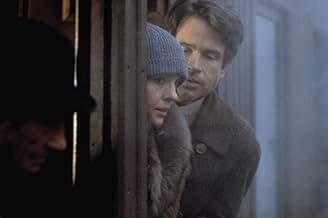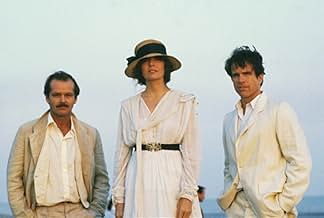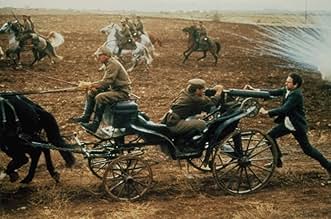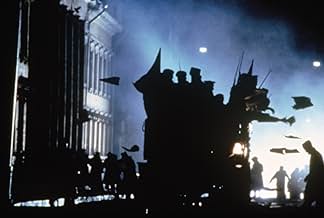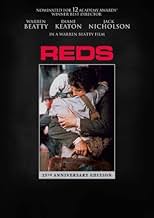PUNTUACIÓN EN IMDb
7,3/10
26 mil
TU PUNTUACIÓN
Un periodista estadounidense radical se involucra con la revolución comunista en Rusia y espera llevar su espíritu e idealismo a los Estados Unidos.Un periodista estadounidense radical se involucra con la revolución comunista en Rusia y espera llevar su espíritu e idealismo a los Estados Unidos.Un periodista estadounidense radical se involucra con la revolución comunista en Rusia y espera llevar su espíritu e idealismo a los Estados Unidos.
- Dirección
- Guión
- Reparto principal
- Ganó 3 premios Óscar
- 22 premios y 37 nominaciones en total
Eleanor Wilson
- Mrs. Reed
- (as Eleanor D. Wilson)
Reseñas destacadas
"Reds" is a 200-minute epic masterpiece which deals with left-wing American journalist John Reed (Warren Beatty in an Oscar-nominated performance) and his coverage of the Russian Revolution of the 1910s. Beatty's passion is what carries this ambitious film, which could have easily been a multi-million dollar disaster. His Oscar-winning direction, screenplay, and overall performance carry the film as far as it can possibly go. The top-flight performances by Diane Keaton, Jack Nicholson (both Oscar-nominated), and Maureen Stapleton (Oscar-winning) all add great depth to the performance. Paul Sorvino, Edward Herrmann, and Gene Hackman also make lasting impressions in supporting roles. Overall a great achievement all the way around. 5 stars out of 5.
'Reds' is one of the finest American films ever made- it is the film that Beatty worked towards from 'Bonnie & Clyde'; tellingly he would not make another film until the excerable 'Ishtar' (which was probably more fun to make than watch).
This film feels like a cross between David Lean ('Dr Zhivago' & 'Lawrence of Arabia' from his oeuvre) and Oliver Stone (in 'Nixon' mode). As with 'Bonnie & Clyde' the right music has been picked for the soundtrack- 'The Internationale' & Keaton's take of '...In my Yard' standout (though the score is taken from Sondheim, with contributions by 'Graduate'-composer Dave Gruisin). The film is brilliantly shot by the great Vittorio Storaro- who uses the same huge talent as he did on Bertolucci's 'Il Conformista' & Coppola's 'Apocalypse Now Redux'. Trevor Griffiths co-wrote this film- though there were contributions from a variety of historians- most notably Robert Rosenstone.
Fans of the film should consult Rosenstone's biography of John Reed ('Romantic Revolutionary') and his chapter on his involvement with and objections to elements in 'Reds' in the book 'Visions of the Past'. This Biopic is an interpretation of a life- as with films like 'Patton' it takes a rather small period of the protaganists total life experience- running from roughly 1914 to Reed's death from typhus in 1920. The film charts Reed's major experiences- his coverage of the First World War and the Mexican War of 1916 is shown- though the major achievments are his ventures into the complexities of American Socialism and American-Communism and his eventual experience in Russia/Soviet Union. The main aspect, the stalwart element throughout the film is his love affair with Louise Bryant- which is where the film begins and ends. Rosenstone believes this may have been a concession to Hollywood audience- but I think it puts the human and greater-backdrop into context.
'Visions of the Past' censures much of Beatty's "twists of truth" and the filmic conventions of compression and dramatic-symbolistic interpretation. This is not a documentary and this is not the actual John Reed. This is a biopic film, starring Warren Beatty playing 'John Reed'. If you want to read about the real thing- try 'Romantic Revolutionary' and Reed's masterpiece 'Ten Days That Shook the World' (which, ironically, came in for criticism regarding Reed's fictionalisation of the events of the Russian Revolution!- see the introduction to the Penguin edition by AJP Taylor). Remember historians have a vested interest in their interpretation- which by placing into lineal order in a history (non-fiction) book they are placing into a narrative form.
Beatty and Keaton are great in this film- with brilliant support from Gene Hackman,Jack Nicholson, Paul Sorvino & Maureen Stapleton. We see the John Reed on-screen move from Jack Reed journalist to John Reed idealist- the only American to be buried within the walls of the Kremlin.
Various anti-commies have objected to this film as it depicts Communism- well, at the time, this development from Marx/Engels 1848 Manifesto seemed liberating. Many intellectuals pondered on a new collective, non-Capitalist world- which was sadly a utopia that was unattainable. The Russian experiment failed- Beatty alludes to the flaws and Stalinism in the speech which the Party retranslate towards their own ends towards the end of the film. The Russian Revolution was an ideal- the workers of the world uniting- which considering the treatement meted out by the likes of Henry Ford was a good thing. This message is still relevant- as 'free market Capitalism' means market dominance for Superpowers, poverty for others- the persistence of a constant underclass and the eradication of Union Rights. There are as many flawed ethics to Capitalism as Communism- the arms trade (Reagan/Bush to Hussain, the US-sponsored coup in Chile-Cambodia-El Salvador- a policy which continues up to the failed one last week in Venezuala). Beatty takes the socialist ideals which 'Shampoo' alluded to and which he continued in the satirical 'Bulworth'.
Unlike Attenborough's 'Gandhi', this is not a biopic that is too reverent to its focus- many times Reed is shown to be a clown and it is Bryant's character who undergoes the vaster change- giving this film a strong feminist element. The other stroke of genius is the use of the witnesses- who provide a commentary on the film that sometimes contradict each other- alluding to a multiplicity of truths that overlap (as with Stone's alternate scenarios in 'JFK' & 'Nixon'- they themselves are not true but point out that the truth is relative and the accepted historist take may not be any more "real").
The Oscar people exhibited their usual poor taste again- choosing the yawnworthy 'Chariots of Fire' over this for best picture (well, the year before they chose 'Ordinary People' over 'Raging Bull'- and to this day mediocrity wins that coveted award: 'Forrest Gump', 'Schindler's List', 'Gladiator', 'Braveheart', 'Titanic'). This film has an epic scope- that the worthy Oscar winner 'The English Patient' also exhibited- though both show influence from David Lean. This was a time when Hollywood had ambition and made some great films that may not have set the box-office on fire a la 'Jaws' or 'Star Wars' but made some great works for posterity: 'The Deer Hunter', 'New York New York', 'Raging Bull', 'Heavens Gate' and this. 'Reds' is a masterpiece that should be seen by everyone and desrves to take its place alongside classic works by directors such as John Ford, Howard Hawks and Orson Welles.
This film feels like a cross between David Lean ('Dr Zhivago' & 'Lawrence of Arabia' from his oeuvre) and Oliver Stone (in 'Nixon' mode). As with 'Bonnie & Clyde' the right music has been picked for the soundtrack- 'The Internationale' & Keaton's take of '...In my Yard' standout (though the score is taken from Sondheim, with contributions by 'Graduate'-composer Dave Gruisin). The film is brilliantly shot by the great Vittorio Storaro- who uses the same huge talent as he did on Bertolucci's 'Il Conformista' & Coppola's 'Apocalypse Now Redux'. Trevor Griffiths co-wrote this film- though there were contributions from a variety of historians- most notably Robert Rosenstone.
Fans of the film should consult Rosenstone's biography of John Reed ('Romantic Revolutionary') and his chapter on his involvement with and objections to elements in 'Reds' in the book 'Visions of the Past'. This Biopic is an interpretation of a life- as with films like 'Patton' it takes a rather small period of the protaganists total life experience- running from roughly 1914 to Reed's death from typhus in 1920. The film charts Reed's major experiences- his coverage of the First World War and the Mexican War of 1916 is shown- though the major achievments are his ventures into the complexities of American Socialism and American-Communism and his eventual experience in Russia/Soviet Union. The main aspect, the stalwart element throughout the film is his love affair with Louise Bryant- which is where the film begins and ends. Rosenstone believes this may have been a concession to Hollywood audience- but I think it puts the human and greater-backdrop into context.
'Visions of the Past' censures much of Beatty's "twists of truth" and the filmic conventions of compression and dramatic-symbolistic interpretation. This is not a documentary and this is not the actual John Reed. This is a biopic film, starring Warren Beatty playing 'John Reed'. If you want to read about the real thing- try 'Romantic Revolutionary' and Reed's masterpiece 'Ten Days That Shook the World' (which, ironically, came in for criticism regarding Reed's fictionalisation of the events of the Russian Revolution!- see the introduction to the Penguin edition by AJP Taylor). Remember historians have a vested interest in their interpretation- which by placing into lineal order in a history (non-fiction) book they are placing into a narrative form.
Beatty and Keaton are great in this film- with brilliant support from Gene Hackman,Jack Nicholson, Paul Sorvino & Maureen Stapleton. We see the John Reed on-screen move from Jack Reed journalist to John Reed idealist- the only American to be buried within the walls of the Kremlin.
Various anti-commies have objected to this film as it depicts Communism- well, at the time, this development from Marx/Engels 1848 Manifesto seemed liberating. Many intellectuals pondered on a new collective, non-Capitalist world- which was sadly a utopia that was unattainable. The Russian experiment failed- Beatty alludes to the flaws and Stalinism in the speech which the Party retranslate towards their own ends towards the end of the film. The Russian Revolution was an ideal- the workers of the world uniting- which considering the treatement meted out by the likes of Henry Ford was a good thing. This message is still relevant- as 'free market Capitalism' means market dominance for Superpowers, poverty for others- the persistence of a constant underclass and the eradication of Union Rights. There are as many flawed ethics to Capitalism as Communism- the arms trade (Reagan/Bush to Hussain, the US-sponsored coup in Chile-Cambodia-El Salvador- a policy which continues up to the failed one last week in Venezuala). Beatty takes the socialist ideals which 'Shampoo' alluded to and which he continued in the satirical 'Bulworth'.
Unlike Attenborough's 'Gandhi', this is not a biopic that is too reverent to its focus- many times Reed is shown to be a clown and it is Bryant's character who undergoes the vaster change- giving this film a strong feminist element. The other stroke of genius is the use of the witnesses- who provide a commentary on the film that sometimes contradict each other- alluding to a multiplicity of truths that overlap (as with Stone's alternate scenarios in 'JFK' & 'Nixon'- they themselves are not true but point out that the truth is relative and the accepted historist take may not be any more "real").
The Oscar people exhibited their usual poor taste again- choosing the yawnworthy 'Chariots of Fire' over this for best picture (well, the year before they chose 'Ordinary People' over 'Raging Bull'- and to this day mediocrity wins that coveted award: 'Forrest Gump', 'Schindler's List', 'Gladiator', 'Braveheart', 'Titanic'). This film has an epic scope- that the worthy Oscar winner 'The English Patient' also exhibited- though both show influence from David Lean. This was a time when Hollywood had ambition and made some great films that may not have set the box-office on fire a la 'Jaws' or 'Star Wars' but made some great works for posterity: 'The Deer Hunter', 'New York New York', 'Raging Bull', 'Heavens Gate' and this. 'Reds' is a masterpiece that should be seen by everyone and desrves to take its place alongside classic works by directors such as John Ford, Howard Hawks and Orson Welles.
A fascinating, expertly made look at why "The Red Menace" never was that, here in the United States, and why the Russian Revolution never turned out to be what it could have been.
Technically, the movie is beautiful to look at, well written and well acted. It has a lot of great professional actors in it, and lots of the people who were actually there at the time this part of our history was being made. The "witnesses" device works well for Warren Beatty who as a director and writer always seems to include the easily overlooked details of the stories in most of his films. He is also at his fumbling best as John Reed, whose 10 Days That Shook The World fell into well-deserved obscurity probably almost as soon as it was written. That this great historical perspective could rise out of that is truly a testimony to Beatty's talent.
There are many great acting performances in this film, including one of Jack Nicholson's very best as Eugene O'Neil, as well as those of Paul Sorvino, Gene Hackman and George Plimpton who demonstrate the range of persons who touched Jack Reed's life. Jerzy Kozinsky is riveting as Zinoviev.
If one likes historically based dramas, this one should leave you breathless, and will probably leave you wanting to watch it more than once, just to make sure you don't miss any of the details.
10 Stars, Absolutely.
Technically, the movie is beautiful to look at, well written and well acted. It has a lot of great professional actors in it, and lots of the people who were actually there at the time this part of our history was being made. The "witnesses" device works well for Warren Beatty who as a director and writer always seems to include the easily overlooked details of the stories in most of his films. He is also at his fumbling best as John Reed, whose 10 Days That Shook The World fell into well-deserved obscurity probably almost as soon as it was written. That this great historical perspective could rise out of that is truly a testimony to Beatty's talent.
There are many great acting performances in this film, including one of Jack Nicholson's very best as Eugene O'Neil, as well as those of Paul Sorvino, Gene Hackman and George Plimpton who demonstrate the range of persons who touched Jack Reed's life. Jerzy Kozinsky is riveting as Zinoviev.
If one likes historically based dramas, this one should leave you breathless, and will probably leave you wanting to watch it more than once, just to make sure you don't miss any of the details.
10 Stars, Absolutely.
.
I am old enough to have lived through (probably) three different Americas. These are radically different worlds. It isn't just the mood, styles or state of the economy; its the adoption of a whole cosmology. Religions change under our feet. Family, love, belonging. These things are malleable yet largely beyond our control and we forget what "things were like." Memory always is constructed in terms of the present world.
Always.
So projects like this are necessary. We cannot know who we are unless we remind ourselves who we were.
The ordinary fold here is a romance, folded into grand political actions. Here they are a bit more cerebral than usual, but never getting past the notion of simple justice.
The more unusual and complex fold is that we see a story based on real events and people. Interspersed with that story are interviews of people who were personally involved in the story. These are remarkable, the way they are captured and the way they are edited to overlap with and annotate the story. But much more engaging is that these are enticing people, many with minds and phases that invite us into their faces made warmer and more open by Beatty's camera. I compare this to the "Up" serious and the contrast is astonishing. True, here we want to be informed about the lives of others, and the "Up" goals pretend that the people randomly selected decades ago are remotely worth knowing.
But these folks are. We want more, simply based on their implicit invitation, and we carry ourselves into the narrative more forcefully, sort of like the characters do. This is folding doing its job and doing it well. They remember. I remember, and therefore am.
Ted's Evaluation -- 3 of 3: Worth watching.
I am old enough to have lived through (probably) three different Americas. These are radically different worlds. It isn't just the mood, styles or state of the economy; its the adoption of a whole cosmology. Religions change under our feet. Family, love, belonging. These things are malleable yet largely beyond our control and we forget what "things were like." Memory always is constructed in terms of the present world.
Always.
So projects like this are necessary. We cannot know who we are unless we remind ourselves who we were.
The ordinary fold here is a romance, folded into grand political actions. Here they are a bit more cerebral than usual, but never getting past the notion of simple justice.
The more unusual and complex fold is that we see a story based on real events and people. Interspersed with that story are interviews of people who were personally involved in the story. These are remarkable, the way they are captured and the way they are edited to overlap with and annotate the story. But much more engaging is that these are enticing people, many with minds and phases that invite us into their faces made warmer and more open by Beatty's camera. I compare this to the "Up" serious and the contrast is astonishing. True, here we want to be informed about the lives of others, and the "Up" goals pretend that the people randomly selected decades ago are remotely worth knowing.
But these folks are. We want more, simply based on their implicit invitation, and we carry ourselves into the narrative more forcefully, sort of like the characters do. This is folding doing its job and doing it well. They remember. I remember, and therefore am.
Ted's Evaluation -- 3 of 3: Worth watching.
Bolshevik leader V.I. Lenin once wrote, "The capitalists will sell us the rope with which we will hang them."
Lenin's quote came to mind when I was watching one of the most spellbinding movies to come along in years,and not since David Lean's brilliant 1965 epic classic "Doctor Zhivago" hasn't been a movie in recent memory that has come close. That motion picture is "Reds",released in 1981 by Paramount Pictures. The film was Warren Beatty's peeve project which he served not only as it star,but also the co-writer and direction. Director Warren Beatty's epic love story about American writers John Reed and Louise Bryant,set amid of the turbulence of American politics in the 1910's World War I and the Russian revolution that set this movie into plain focus. The movie itself is astounding to behold and is a tragic love story between the writers John Reed(Warren Beatty),and Louise Bryant(Diane Keaton). But it creatively used artsy,radical Greenwich Village in the 1910's-and such as real-life characters as playwright Eugene O'Neill(Jack Nicholson),and anarchist activist Emma Goldman(Maureen Stapleton)-as well as the drama of the Russian Revolution and the subsequent civil war as the principal landscapes in which their relationship plays out.
Director Beatty also made creative use of on-camera "testimony" by the likes of novelists Henry Miller and Rebecca West,Republican politician Hamilton Fish,comic George Jessel and civil libertarian Roger Baldwin. These senior citizens recall,with varying degrees of historical accuracy,Reed,Bryant and the times in which they lived. "Reds" shows convincingly that many of the contemporary issues in politics and culture have their antecendents in the first debates of the 20th century. Debates over birth control and abortion,marriage and commitment,public life versus private life,revolution versus reform are given full expression from varying viewpoints throughout the lengthy film(which runs over three hours). To Beatty's credit,his film captures the excitement the Bolshevik revolution stirred,both inside and outside Russia while revealing how the Bolshevik leadership quickly began to suppressing dissent within the revolutionary ranks on the way to becoming a dictatorship with a country that is in constant turmoil. Beatty's efforts certainly paid off artistically,bringing him prestige to him and Paramount making "Reds" a huge box office success for the studio when it premiered in theatres around Christmas of 1981.
"Reds" became one of the top highest grossing pictures of that year,and it paid off in high standards too. "Reds",which received 12 Academy Award nominations including Best Picture,lost an upset to Hugh Hudson's "Chariots Of Fire" in the Best Picture category. However it won three Oscars for Best Director(Warren Beatty),Best Supporting Actress(Maureen Stapleton),and Best Cimematopgraphy(Vittorio Storaro). Eventually,"Reds" made more than $40 million at the domestic box office,and once international figures were added in,it became one of the top grossing films of the 1980's. A feat Warren Beatty is still proud of to this day.
Lenin's quote came to mind when I was watching one of the most spellbinding movies to come along in years,and not since David Lean's brilliant 1965 epic classic "Doctor Zhivago" hasn't been a movie in recent memory that has come close. That motion picture is "Reds",released in 1981 by Paramount Pictures. The film was Warren Beatty's peeve project which he served not only as it star,but also the co-writer and direction. Director Warren Beatty's epic love story about American writers John Reed and Louise Bryant,set amid of the turbulence of American politics in the 1910's World War I and the Russian revolution that set this movie into plain focus. The movie itself is astounding to behold and is a tragic love story between the writers John Reed(Warren Beatty),and Louise Bryant(Diane Keaton). But it creatively used artsy,radical Greenwich Village in the 1910's-and such as real-life characters as playwright Eugene O'Neill(Jack Nicholson),and anarchist activist Emma Goldman(Maureen Stapleton)-as well as the drama of the Russian Revolution and the subsequent civil war as the principal landscapes in which their relationship plays out.
Director Beatty also made creative use of on-camera "testimony" by the likes of novelists Henry Miller and Rebecca West,Republican politician Hamilton Fish,comic George Jessel and civil libertarian Roger Baldwin. These senior citizens recall,with varying degrees of historical accuracy,Reed,Bryant and the times in which they lived. "Reds" shows convincingly that many of the contemporary issues in politics and culture have their antecendents in the first debates of the 20th century. Debates over birth control and abortion,marriage and commitment,public life versus private life,revolution versus reform are given full expression from varying viewpoints throughout the lengthy film(which runs over three hours). To Beatty's credit,his film captures the excitement the Bolshevik revolution stirred,both inside and outside Russia while revealing how the Bolshevik leadership quickly began to suppressing dissent within the revolutionary ranks on the way to becoming a dictatorship with a country that is in constant turmoil. Beatty's efforts certainly paid off artistically,bringing him prestige to him and Paramount making "Reds" a huge box office success for the studio when it premiered in theatres around Christmas of 1981.
"Reds" became one of the top highest grossing pictures of that year,and it paid off in high standards too. "Reds",which received 12 Academy Award nominations including Best Picture,lost an upset to Hugh Hudson's "Chariots Of Fire" in the Best Picture category. However it won three Oscars for Best Director(Warren Beatty),Best Supporting Actress(Maureen Stapleton),and Best Cimematopgraphy(Vittorio Storaro). Eventually,"Reds" made more than $40 million at the domestic box office,and once international figures were added in,it became one of the top grossing films of the 1980's. A feat Warren Beatty is still proud of to this day.
¿Sabías que...?
- CuriosidadesReportedly, Warren Beatty reshot some scenes up to 35 times. Paul Sorvino said he did as many as 70 takes for one scene, and Maureen Stapleton said she did as many as 80 takes for another. Reportedly, of this, she famously once said to Warren Beatty, "Are you out of your fucking mind?" This earned her a round of applause from the crew.
- PifiasThe Finnish doctor tells Reed that his blood pressure is too high, but at that time, hypertension was not considered a problem by most doctors, who did not even consider treating it. Not until the mid-'40s did doctors begin to understand the dangers of high blood pressure.
- Citas
Eugene O'Neill: If you were mine, I wouldn't share you with anybody or anything. It'd be just you and me. We'd be the center of it all. I know it would feel a lot more like love than being left alone with your work.
- Créditos adicionalesAs the credits roll, additional interviews with the 'witnesses' play.
- Versiones alternativasThree seconds of horse falls were cut from the British version. The DVD supplements showing these shots are also cut in England.
- ConexionesFeatured in Sneak Previews: Rollover, Quartet, My Dinner with Andre, Reds (1981)
- Banda sonoraYou're a Grand Old Flag
Written by George M. Cohan
Selecciones populares
Inicia sesión para calificar y añadir a tu lista para recibir recomendaciones personalizadas
- How long is Reds?Con tecnología de Alexa
Detalles
Taquilla
- Presupuesto
- 32.000.000 US$ (estimación)
- Recaudación en Estados Unidos y Canadá
- 40.382.659 US$
- Fin de semana de estreno en EE. UU. y Canadá
- 2.325.029 US$
- 6 dic 1981
- Recaudación en todo el mundo
- 40.382.788 US$
Contribuir a esta página
Sugerir un cambio o añadir el contenido que falta



